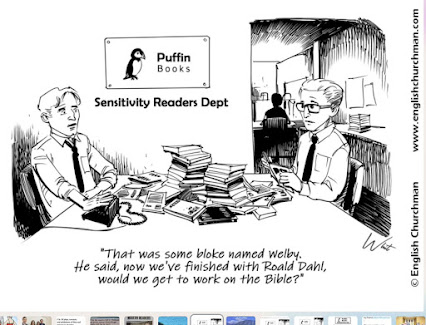This is a big book!
There are 708 pages of small font, followed by notes and appendix and index.
And being by a great Church historian it is not an easy read.
None of his books are.
Diarmaid MacCulloch, as you can tell by the name, is an Englishman! His grandfather was an Anglican vicar, his father also, and during the 1970s Diarmaid also wished to become a clergyman. This however, was hindered b y his homosexuality, which he did not hide. Today he would be welcomed and rushed through to Bishop hood! This has been a sore point with him ever since, every book he writes, every TV and Radio appearance, every article makes clear his anguish at being rejected. He himself also makes very clear the biblical teaching throughout indicates that this is a fault, and a sexuality that if acted upon becomes sin. However, underneath each page he is trying to change this.
This does not detract from his research work however. Covering the period from 1490 - 1700 he delves into the working of the church, and then the churches, throughout Europe at this time. And what a mess there is to investigate. On one side we have the two straight forward sides Roman Catholic and Protestant, it is soon clear that the advantage of teaching people to read and giving them a bible to actually work on, the invention of the printing press came at a good time, also released a great many versions of understanding the clear 'Word of God.' As time passes Anabaptists, Lutherans, Calvinists, Catholics seeking reformation, Catholics not seeking reformation, Inquisitions, states which accept differing opinions, states which accept only one, some large states, some small.
Each page offers another 'great man' who has diligently come up with his own understanding, some thoughtful some absurd, every so often this one or that is burnt at the stake or exiled because of their beliefs or lack thereof. On top of this there is straight forward war between states. Catholic Spain dominates the Netherlands, and were not too happy about it, Austria had wars, Poland tried not to have them, France had Huguenots and liked them until they didn't, England had a King desperate for a son and dumped the Pope because he disagreed with that kings efforts to obtain one. So Anglicanism, the Church of England with a monarch as head was born. Scotland became Calvinist under John Knox and was better for it. For states in the east of Europe there was the Orthodox tendency and the Ottoman Muslim attacks from the south, they held much of the Balkans and Austro-Hungary at the time.
Two things come out of this. One is the lack of the Supernatural in this. Talk is of the Holy Spirit but little appears to be seen. People argue, for several reasons not always honest, for their view of the bible, but almost none expect the supernatural intrusion from the Holy Spirit which is where true believers begin! Intellect may help you find God but not without the Holy Spirit to open you to receive. Much argument, little Biblical Love.
This brings out the second aspect of this book, violence. These were violent times. Punishment for crime was rough and unpleasant. It is not a surprise that various religious groups used similar tactics on their enemies, sometimes to avoid them being used on themselves. However, to our eyes, in a day in which punishment appears to have been removed from society, we find, flogging, beating, exiling or burning people unsatisfactory. I am quite pleased we take this attitude today.
It is fair to say he is an outstanding historian, one I would always recommend. This tome if full of information which reflects the long period of research which has gone into the work. The length of the book would be shorter bar the authors delight in giving individuals their full title, always adding his opinion of them as he does so, thus adding 150 ages to the work! There can be no doubt that if you wish to understand the Reformation this is one book that must be read to inform and, to some, delight.
I began this book just before Covid arrived, then put it down as during that time I had difficulty reading, I just could not sum up the energy, and little was read. Since then I have been trying to finish all the books, another one of this man's sits already begin on the shelf, it will remain there for a while, as I fight my way through all the books piling up on the 'to Read' shelf.
I am however glad to have finished this book. I learned a great deal, especially about biblical arguments, clearly you can make the bible say what you wish if you refuse to read what it actually says! The arguments and history, the vast number of names that flash across the page, can be very distracting, so much information is found here. That said I recommend this book to anyone who has the time to read it, in paperback, much History will be found, much about church and much about people all the way through. A good thorough, but long read.


3 comments:
I've just had a look at him on the internet...he sounds a most interesting man and a good scholar.
Fly, Indeed. Look out for him he is often called upon. He did 5 programmes in the Radio 3 'Essay' a while back about churches in Norfolk.
Sounds fascinating. I do shudder at the small print though, I am an old lady and that makes me hard to read. Also, I have to make notes of the names if there are lots of them!
Post a Comment